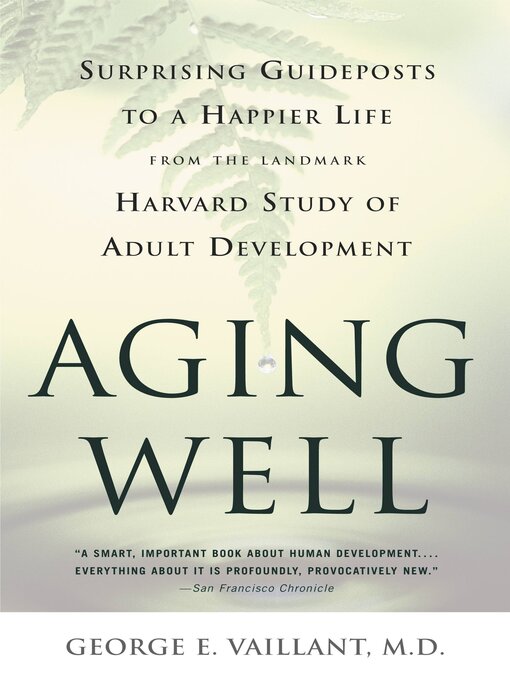Aging Well
Surprising Guideposts to a Happier Life from the Landmark Study of Adult Development
He explains precisely why some people turn out to be more resilient than others, the complicated effects of marriage and divorce, negative personality changes, and how to live a more fulfilling, satisfying and rewarding life in the later years. He shows why a person's background has less to do with their eventual happiness than the specific lifestyle choices they make. And he offers step-by-step advice about how each of us can change our lifestyles and age successfully. Sure to be debated on talk shows and in living rooms, Vaillant's definitive and inspiring book is the new classic account of how we live and how we can live better. It will receive massive media attention, and with good reason: we have never seen anything like it, and what it has to tell us will make all the difference in the world.
-
Creators
-
Publisher
-
Release date
December 14, 2008 -
Formats
-
Kindle Book
- ISBN: 9780316054805
-
OverDrive Read
- ISBN: 9780316054805
-
EPUB ebook
- ISBN: 9780316054805
- File size: 20464 KB
-
-
Languages
- English
-
Reviews
-
Publisher's Weekly
November 5, 2001
This groundbreaking sociological analysis is based on three research projects that followed over 800 people from their adolescence through old age. Subjects were drawn from the Harvard Grant study of white males, the Inner City study of non-delinquent males and the Terman Women study of gifted females, begun respectively in 1921, 1930 and 1911. In all three studies, subjects were interviewed at regular intervals over time, a design that prevented observations from being skewed by the distortions of memory and allowed for analyses that distinguished effect from cause. Vaillant (The Natural History of Alcoholism), a psychiatrist and professor at the Harvard Medical School, brings a nuanced point of view and an acceptance of the project's limitations. (Those followed were not randomly selected and were overwhelmingly Caucasian.) Nevertheless the author makes compelling use of his data, which is based on intensive contacts with a variety of subjects. Vaillant posits that successful physical and emotional aging is most dependent on a lack of tobacco and alcohol abuse by subjects, an adaptive coping style, maintaining healthy weight with some exercise, a sustained loving (in most cases, marital) relationship and years of education. This is good news since factors that cannot be altered, such as ancestral longevity, parental characteristics and childhood temperament, were among those ruled out as predictors. The book's academic tone will reassure some readers and put others off, but Vaillant's arresting interviews with selected subjects (recounted here) and his ability to learn from the subjects make this an outstanding contribution to the study of aging. National publicity. -
Library Journal
-
Booklist
December 15, 2001
Vaillant, a psychiatrist interested in adult development, has been associated with three studies in that field for more than 30 years. The subjects of those studies are, respectively, 268 Harvard graduates, 456 disadvantaged inner-city men, and 90 intellectually gifted women. The figures are important because none are large or socially broad enough to be extrapolated to the general public, and Vaillant never claims otherwise. Yet, illustrating his points with highly personal case histories, he offers much valuable information about aging, and his judgment calls (his term) are perceptive, understanding, and often tinged with delightful humor. He identifies six great tasks of becoming an adult and emphasizes the necessity of social, emotional, and physical health. Unfortunately, he finds that neither wisdom nor spirituality necessarily grows with age. Still, retirement isn't inevitably a major life problem, and luck can be a decisive factor. People age individually, and predicting what a young or middle-aged person will become with age is often impossible. Vaillant, a self-described optimist nevertheless, contributes sensibly to a field famous for vapid, ivory-tower writing.(Reprinted with permission of Booklist, copyright 2001, American Library Association.) -
Library Journal
Starred review from November 15, 2001
A respected researcher, psychiatrist, professor at Harvard Medical School, and author of several books (e.g., The Natural History of Alcoholism), Vaillant uses individual life histories to illustrate how social and emotional development is an ongoing process. His work is based on Harvard's Study of Adult Development, which followed "824 individuals all selected as teenagers for different facets of mental and physical health more than half a century ago and studied for their entire lives." Participants answered biennial questionnaires and underwent physical examinations every five years. Vaillant points out that, while studies like this one are not representative, they do reveal how lifestyle choices can affect whether we reach a happy and healthy old age. He describes the developmental processes that make old age vital being ill without feeling sick, regaining the capacity of creativity and play, acquiring wisdom, and cultivating spirituality and offers suggestions for successful and happy aging. Highly recommended. [Previewed in Prepub Alert, LJ 9/15/01.] Jodith Janes, Cleveland Clinic Fdn. Lib.Copyright 2001 Library Journal, LLC Used with permission.
-
Formats
- Kindle Book
- OverDrive Read
- EPUB ebook
subjects
Languages
- English
Loading
Why is availability limited?
×Availability can change throughout the month based on the library's budget. You can still place a hold on the title, and your hold will be automatically filled as soon as the title is available again.
The Kindle Book format for this title is not supported on:
×Read-along ebook
×The OverDrive Read format of this ebook has professional narration that plays while you read in your browser. Learn more here.



